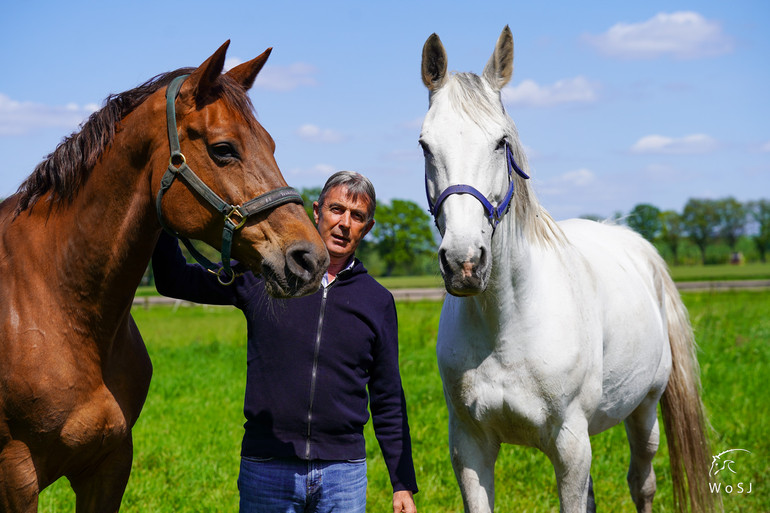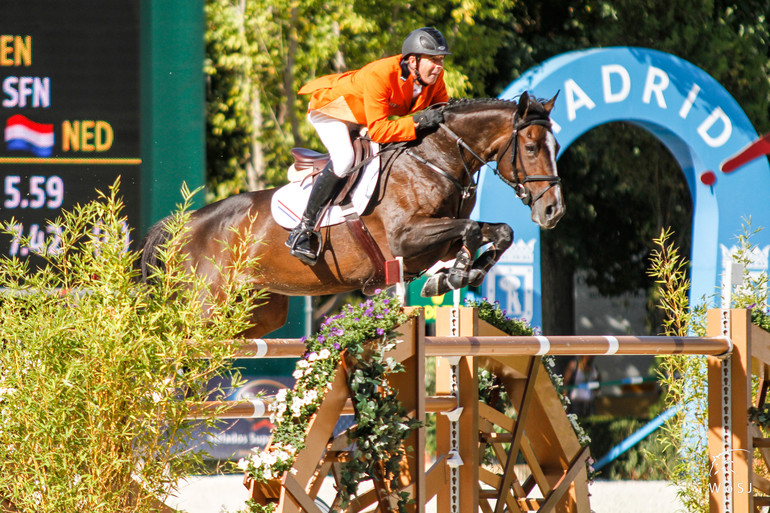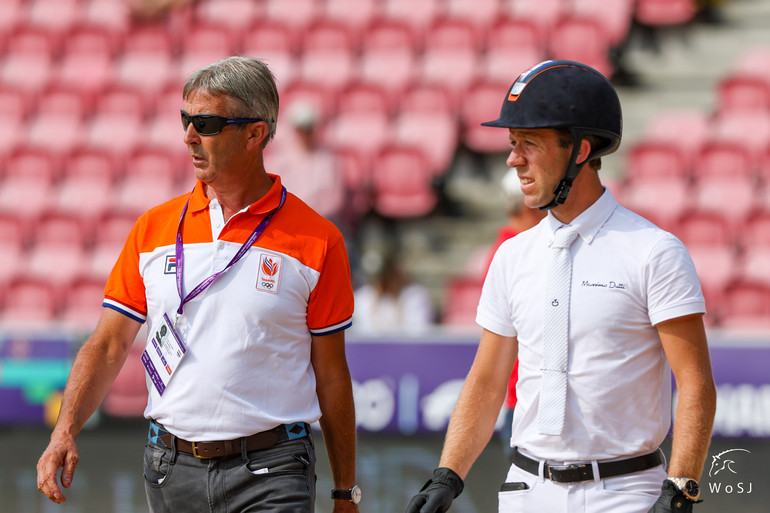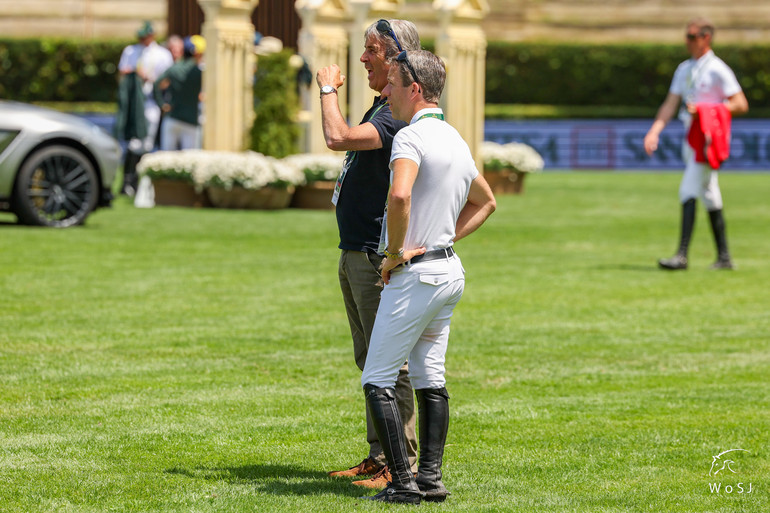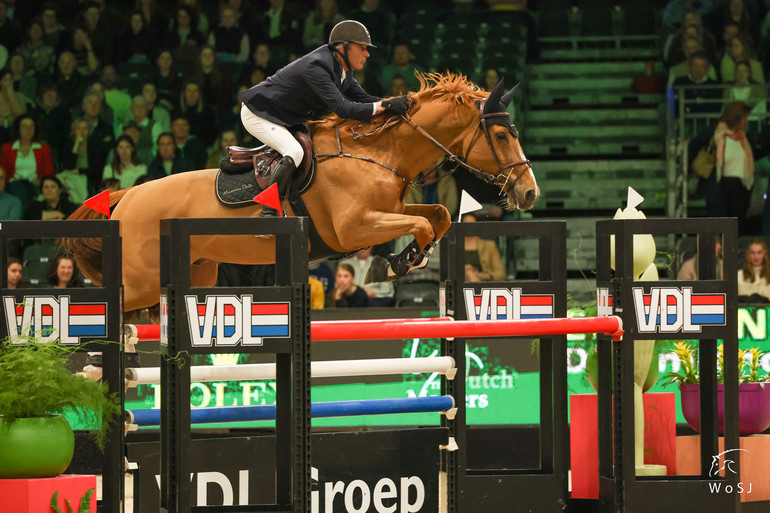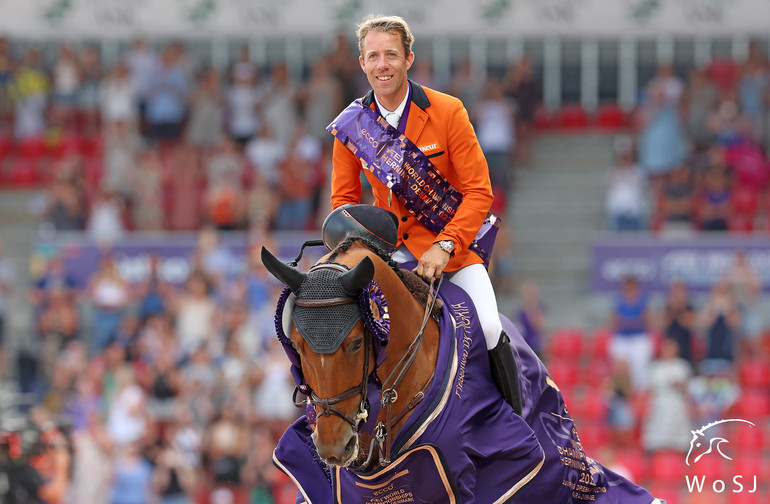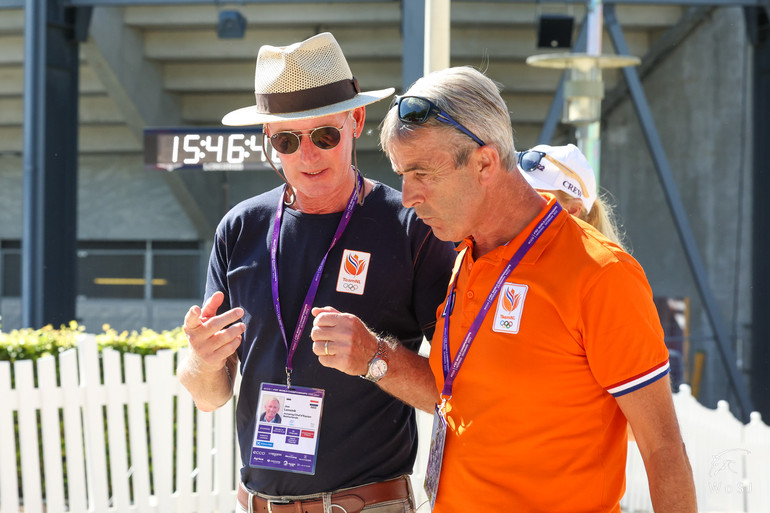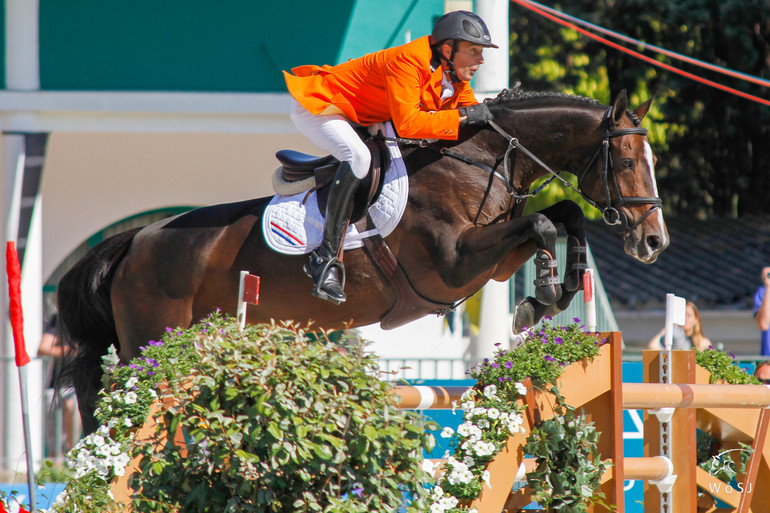Text © World of Showjumping
“As a rider – and especially a young one – it is important to be critical of yourself,” Eric van der Vleuten tells World of Showjumping. “Quite often, you see a vet being called to check on a horse that did not jump well, when actually it can be yourself who just rode badly. I don’t like it when people find excuses; if the horse does not feel well, you should not have jumped in the first place.”
“Instead of finding excuses, it is very important to look at yourself first and that is also what you see the top riders do,” Eric continues. “If Henrik (von Eckermann) has one down, he is sick of himself and says he has to do better. It is easy to say your horse was this or that, when in fact you only need to think about your own riding – and do better. If my son Maikel comes out of the ring with a mistake, I don’t need to tell him – he will know. I think that is very important for everyone to understand; the very first thing is to ride well.”
It all started in Asten
Eric himself inherited his love for horses from his father Leo. “My father used to have horses at home. He was riding more as a hobby, but always kept a few horses and he brought me to the riding school that the Heijligers-family has in Asten. I was really interested in riding and horses, but my father died when I was very young – I was thirteen at the time. Piet Raijmakers went to the same riding school as I did, and together with the Heijligers-family, he helped me continue with riding. Even though I was young, they gave me horses to ride – and I loved it. Mostly, I went to the shows with Piet, who is seven years older than me – it was him who carried me through that time. We always went together; I grew up with Piet and the Heijligers-family and I learned a lot from them.”
The feeling of Maikel winning a medal is even better than if I would have won it myself
“When I finished school at 18, I went riding for Mr. Beekmans in Eindhoven and I stayed there until I was 23. I had good years there; I won the European Championship for young riders in 1982 and I was Dutch junior champion twice. At 23, I started working for Henk Nooren – who stopped riding at the time – and stayed for over two years. When I was 25, I started on my own, ten minutes from where I live now. I must say I always had good people around me, and good horse owners. For many years, I had very good, competitive horses, but I never had a real championship horse. Back then, we did a lot of World Cups, and we used to do the whole tour around from Oslo to Helsinki and Aarhus. I had a couple of nice wins in Oslo and Helsinki, and was second in Gothenburg when Jan Tops won there. I had a very good career, even though I did not win many championships; luckily, I have done that with Maikel later on. The feeling of Maikel winning a medal is even better than if I would have won it myself.”
One team
Today, Eric, his wife Mariel, and their sons Maikel and Eric Jr. work together as one team. “When my kids are winning, it feels as if I would have won myself – for us it is the same,” Eric says. “I do less shows, also because I am busy with managing the whole yard we have at home and helping my sons.”
We are very thankful and lucky to have Marta behind us
After the European Championships in Madrid in 2011, Eric stopped competing for a while. “When Maikel started riding, I gave him the priority on our horses,” he explains. “When Verdi (Quidam de Revel x Landgraf I) was young, Maikel rode him from four to six, then I rode him, and when he was eight, I gave him back to Maikel because I felt he needed a horse for the higher level – and I think that was a good decision. At the time, I had Utascha (Lux x C-Indoctro) from the SFN, and after the Europeans in 2011, she was given to Jeroen Dubbeldam. Both me and Maikel had been on the Dutch team in Madrid – it was the first year Verdi did a championship, he was nine back then – and it felt like the right call to step down. I stopped riding for a few years, and then in 2013 I started working with Sergio Alvarez Moya and Marta Ortega. When Marta got too busy with her family business, she asked if I would continue with her horses. At the time, she had Verdi III (Hors la Loi II x Cantus) and Zigali PS (Kigali x Palfrenier), and that is when I started competing again. The sport had changed a lot in those years – you cannot compare the sport today to what it was when I first started. When I came back, I felt that I still could do the classes well, but I felt less competitive than in my younger years when I was a fast rider and could win. These days, compared to the other riders, I am not that competitive anymore. However, I can still jump the big classes – if I have a horse that can do it.”
It has to be one team
“It would not be possible for us to do the sport at the highest level without the support from someone like Marta. We are very thankful and lucky to have Marta behind us, already for a decade, and we have built a very nice relationship with her and her family,” Eric says. “I think a good relationship like this has a lot to do with respect. Earlier in my career, I rode for both Audi (Eric Berkhof) and VDL (Wim van de Leegte) for nearly ten years, and still today, we have a good connection. This is very important; respect the people who make this all possible for you. You have to do what is right by them, and that is something I want to teach my kids. The same goes for the people who are working with you. Our grooms, they are important; they travel the world with our horses, and you have to have respect for those who make it all possible. It has to be one team.”
Fun with future prospects
Now, Eric has Dreamland (Sunday de Riverland x For Pleasure) for the bigger classes and Iccarone (Carrera x Lord Z) that jumps up to 1.50m classes. “And then I ride a few young horses at home as well,” he tells. “That is something I enjoy a lot. I turn 60 this year, so I won’t jump big classes for that much longer, but I will keep riding, for my own fitness, and because I enjoy it. Producing good young horses and then giving them on to the boys when they feel ready is something I really like. I like to jump the younger horses at local shows, give them mileage so that they are ready when they are at the right age. Top riders need to produce horses as well, because it is nearly impossible to buy them ready when they are older. I think the only way to keep going is to make sure you have young horses coming up behind your top ones.”
Top riders need to produce horses as well, because it is nearly impossible to buy them ready when they are older
“That is my job too; trying to find good young horses, and still there are only a few that really break through,” Eric continues. “What I always try to do, is to be selective and only work with quality. When I have a young horse, I want to see it as an interesting prospect, something I think can be good for the future. Through the years, most horses we had on the top level were produced by ourselves from they were young horses – starting from 1.10m bringing them all the way up. However, it is not easy: If you watch a 1.45m class on a two-star show, you see hundreds of horses jumping like nothing, but then the last step to the very top is difficult – there are only a handful that can do it.”
“I find the mentality of a horse essential,” Eric continues. “And if you are looking for a horse for the very top, they need everything; rideability, scope, carefulness, and the right mentality… I often look for younger horses and these days it is so important that the horses are rideable. Many horses might be so special that only a few riders can sit on them and if you have a young horse like that, it is not a problem if they end up with a top rider. However, if your horse does not end up on the very top, it is important that anyone can ride them. Therefore, rideability is something I look for in young horses, as well as a lot of blood, but in a nice way. It is important that they are light, and easy off the ground. The bigger, heavier horses you don’t see so much on the higher level anymore; horses have to be quick to be competitive these days. Years ago, if you had a horse that could jump a double clear in a Grand Prix, you were in the top three, whereas now – except in very few cases – it does not happen so often. Even with the biggest tracks there are easily ten clears, so you need a quicker horse to be competitive.”
It is important that the right horse comes to the right person, it has to be a fit
“However, you have to try finding horses that fit you as a rider,” Eric points out. “Not every horse is a horse for the same rider; some like a bit more blood, and it is very important that you have the right horse with the right rider. As an example, we had Brooklyn Heights – who Denis Lynch rides now – in our stable and I told Denis that it is a horse he should buy, because I thought they would fit well together. In the beginning, Denis had doubts, but in the end, he came to try and earlier this year they were the only double clear on the last day of the World Cup Finals – it is important that the right horse comes to the right person, it has to be a fit.”
Consistency will get you there
“Maikel is high on the ranking, but I never look at the ranking, and you never should; you should look at your horses,” Eric tells about his approach to competing. “When you keep your horses fit, and go to shows regularly, the results come naturally. If you make a good plan, you will have better results; if you have two to three top horses and you put them in to the right classes at the right venues at the right time.”
I never look at the ranking, and you never should; you should look at your horses
“I prefer to leave a show out instead of going in with a bad feeling,” he continues. “First, look at your horses and work from there. Also, the top riders, like Steve Guerdat, maybe at times they are a little lower on the ranking, but they will always come back – because they are top riders, real horse people. I believe the real horse people will always come back. When you have a good group of horses that is jumping well, you will see it in your ranking, but it will be followed with another time, and that is how it is with horses; they are not machines, there will be ups and downs."
"When you have periods where it is not working, when you have one down, have a bit of bad luck – and everyone will go through a phase like this – it is important to stay quiet," Eric points out. "Don’t start doing weird things, thinking you have to change, try more – you can have one down in the Grand Prix, but it doesn’t automatically mean you’re doing the wrong thing. If you start changing things when you have bad luck, thinking it will help, it often does the opposite. I believe it is important to stay quiet and move on.”
Good horsemanship is about making a good plan
The fact that riders could show every weekend does not mean that they should, Eric points out. “I always tell Maikel that he has to make his show plan for the horses he has, and not for himself. Of course, riders would like to go to all the shows possible, but you have to be realistic with the horses you have and make a good plan for them."
You have to be realistic with the horses you have and make a good plan for them
"This year, we have a good group of horses for Maikel, but we have a team in the Globals, and it is important that we do that well, and on the other hand, he also wants to ride some Nations Cups. However, as a rider, you have to choose," Eric says. "It is easy to burn a horse in a year or two, but I like to work long-term with my horses. If you go to every show, your horse will be done in two years. Verdi did the top sport for ten years and that is what I like. I prefer to do a few shows less every year, but for a longer period of time. A big injury can always happen, but you have to think about your management so that you can have longevity with your horses. It is easy to go from one show to another, but I think good horsemanship is about making a good plan and managing your horses well; I don’t like to over-jump them. If you go in a Grand Prix and get into the jump-off, you have to try to get the most out of the class but the least out of your horse. It is easy to go crazy and go over the line, but I prefer to get a lower placing and maybe miss out on a win if that is better for the horse at that point. You should never go over the level that is possible for your horse.”
You have to try to get the most out of the class but the least out of your horse
“You have to feel your horses and know what you can do with them and what not,” Eric continues. “It is a feeling you have, something I don’t think you can learn. You have to be interested. For example, when I am at home, I like to do the horses myself; ride, lunge, see how they move. If Maikel is riding, even when I am riding at the same time, I keep my eye on his horses as well. I want to know how they start moving, how they trot. Also, in the warm-up at shows, we can warm-up separately, but I always keep an eye on him. It is not that I have to tell him what to do, but sometimes you can see things that he might not feel, and I think this works really well for us.”
I don’t like to push the horses into anything; it has to go naturally, with time, and in a relaxed manner
“At home, I try to keep the training easy and simple – I think many people make it too complicated,” Eric points out. “You have to make the work as easy as possible for the horse. I don’t like to push the horses into anything; it has to go naturally, with time, in a relaxed manner – I always work out of a relaxed mode. What is important, is to work consistently with your horse. It does not mean that you have to be in the indoor every day, but you cannot work really hard for two days and then do nothing for the rest of the week. Horses need movement every day. We do a lot of changes in their program so that it is also mentally interesting for them; we go to the woods, do flat work, go on the race track, jump gymnastics and they also go a lot in the field.”
All that glitters isn’t gold
“Horses are my life,” Eric says. “Many people seem to focus on things that have nothing to do with the sport; shiny boots and nice clothes, a big truck – I don’t care about those luxuries. I want to have a good truck for the horses, a safe truck where the groom also has a good space to stay, but I don’t need any luxury – I don’t care about that. I prefer to have a good horse on a normal truck than the other way around. For me, the horse comes first and the rest around it is what it is.”
For me, the horse comes first and the rest around it is what it is
“People need to be aware that they have to work with their horses themselves; they have to know their horses inside-out – this is what I learned years ago,” Eric says. “George Morris used to say that your horse has to be your best friend – and I think that is absolutely true. When I come to the stable, I go to my horses first and check on them. Younger people don’t grow up like this anymore, the times have changed, and not for the better in this sense. The older generation, like Bosty, has their own way of riding and their own style, but someone like Bosty is a true horseman. If you walk around any showground, you will find him grazing his horses on his own. That is something I often miss with the younger generation; that they would take their horses out and spend time with them, get a closer connection with their horses and learn to know them. I think that is very important. In the end, the horse has to want to do it for you. I still believe that the closer you are to your horse, the better – when you are a real team, that is the most important thing there is.”
In the end, the horse has to want to do it for you
“I enjoy everything there is in working with horses; from the top sport to being at home – I am a horseman, who enjoys everything with horses,” Eric concludes. “I can enjoy just seeing a group of young horses free jump, seeing the natural qualities of the horses. I still enjoy riding, but I don’t have the feeling that I am going to go to another Olympics myself. I like if the boys are doing well and enjoy what they are doing, that is the most important thing for me. Seeing them work in a good way with their horses, I enjoy that. We have had some nice results at championships and if we can continue like this, I am very happy.”
7.6.2023 No reproduction of any of the content in this article will be accepted without a written permission, all rights reserved © World of Showjumping.com. If copyright violations occur, a penalty fee will apply.



